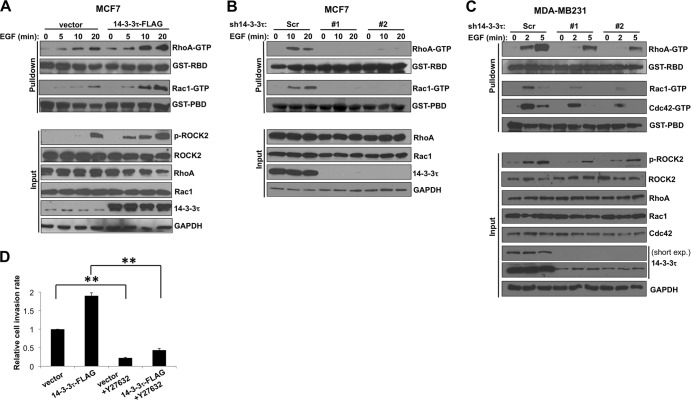FIG 3.
14-3-3τ promotes EGF-induced Rho GTPase activation in breast cancer cells. (A) Overexpression of 14-3-3τ enhanced EGF-induced Rho GTPase activation in MCF7 cells. 14-3-3τ-overexpressing MCF7 and control cells were starved in 0.1% BSA-containing DMEM overnight and then stimulated with EGF (0.1 μg/ml) for the indicated duration. Equal amounts of cell lysates were incubated with GST-RBD- or GST-PBD-conjugated glutathione-Sepharose beads to pull down GTP-bound RhoA or Rac1, followed by SDS-PAGE and immunoblotting using anti-RhoA or anti-Rac1 antibody. Five percent input lysates were subjected to Western blot analysis. GAPDH, glyceraldehyde-3-phosphate dehydrogenase. (B) 14-3-3τ deficiency inhibited EGF-induced RhoA and Rac1 activation in MCF7 cells. 14-3-3τ was knocked down by two shRNA constructs in MCF7 cells. RhoA and Rac1 activity assays were performed as described for panel A. (C) 14-3-3τ was depleted by two shRNA constructs in MDA-MB231 cells. RhoA, Rac1, and Cdc42 activity assays were performed as described for panel A after EGF (0.01 μg/ml) treatment. short exp., a short exposure of the 14-3-3τ immunoblot. (D) ROCK inhibitor Y27632 blocked 14-3-3τ-enhanced cell invasion in MCF-7 cells. **, P < 0.001 (n = 3) (two-tailed t test).

